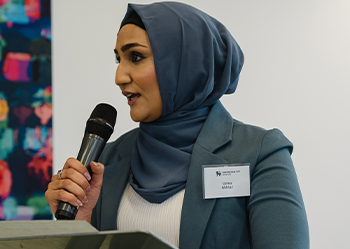University News Last updated 23 February 2024

Women from Black and Global Majority backgrounds who have been victims of domestic abuse could soon be pulling on the uniform of the West Midlands Police – and the move has been welcomed by a leading crime expert from Birmingham City University (BCU).
Dr Laura Hammond, Director of BCU’s Crime and Society Research Centre, said women from Black and Global Majority communities who have experienced domestic abuse “haven’t been heard or taken into account” and need to be consulted if police are going to effectively tackle the issue.
She added: “We’ve been doing research to understand the experiences of those who are victims of domestic abuse. We’re connecting people with different perspectives, expert knowledge and lived experiences to co-create more effective responses to domestic abuse.”
Dr Hammond is working with Women Acting In Today’s Society (WAITS) to give domestic abuse survivors a voice and an opportunity to share their experiences, including the barriers they face when attempting to access housing, benefits, police support and legal aid.
At a conference last week, co-hosted by BCU and WAITS, the idea of domestic abuse survivors working for the police was raised again – and received a favourable response from Tom McNeil, Assistant Police Crime Commissioner for the West Midlands.
“I am convinced that the police’s response to domestic abuse within our diverse communities would be greatly enhanced through a new era of women joining the police to use their real-life experience of abuse and failings in the system,” he said.
“I fully commit to helping partners, including WAITS, explore how we embrace novel recruitment partnerships to attract this diverse talent.”
Dr Hammond said the pledge marked “the start of a new era of partnership between the police and domestic abuse survivors”, while Uzma Akhtar, a domestic abuse survivor herself, expressed her delight at the development. “I would like to become one of those officers myself,” she said.
According to Refuge, police receive a domestic abuse-related call every 30 seconds in the UK.
The charity, which supports women and children experiencing domestic violence, also reports that 40% of homeless women state domestic abuse as a contributory factor to their homelessness.
Last week’s conference – called Change the System – was supported by Nicole Jacob, Domestic Abuse Commissioner for England and Wales, and Labour Councillor Jayne Francis, Cabinet Member for Housing and Homelessness at Birmingham City Council.
“We’ve brought together survivors, advocates and experts to shine a spotlight on the systematic barriers and create meaningful solutions that we expect these sectors to take on board to engage, support and empower women to survive domestic abuse,” said Deirdre LaBassiere, Chair of WAITS.
Marcia Lewinson, CEO of Waits, added: “In Birmingham, we have issues in lack of housing, legal aid and access to justice, issues with benefits and employment, and the reduction of police officers available to respond to women calling for help, which is one every minute in the city.
“By bringing together policymakers and all the services that a woman fleeing domestic abuse would access, we can make sure women are supported to heal themselves and go through the criminal justice system, while meeting the needs of the Department for Work and Pensions.”